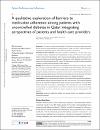A qualitative exploration of barriers to medication adherence among patients with uncontrolled diabetes in Qatar: integrating perspectives of patients and health care providers.
| المؤلف | Jaam, Myriam |
| المؤلف | Hadi, Muhammad Abdul |
| المؤلف | Kheir, Nadir |
| المؤلف | Mohamed Ibrahim, Mohamed Izham |
| المؤلف | Diab, Mohammad Issam |
| المؤلف | Al-Abdulla, Samya Ahmad |
| المؤلف | Awaisu, Ahmed |
| تاريخ الإتاحة | 2021-01-14T07:42:42Z |
| تاريخ النشر | 2018-10-17 |
| اسم المنشور | Patient Preference and Adherence |
| المعرّف | http://dx.doi.org/10.2147/PPA.S174652 |
| الاقتباس | Jaam M, Hadi MA, Kheir N, et al. A qualitative exploration of barriers to medication adherence among patients with uncontrolled diabetes in Qatar: integrating perspectives of patients and health care providers. Patient Prefer Adherence. 2018;12:2205-2216. Published 2018 Oct 17. doi:10.2147/PPA.S174652 |
| الملخص | To develop an in-depth understanding of the barriers to medication adherence among patients with uncontrolled diabetes attending primary health care (PHC) centers in Qatar by exploring and integrating patients' and health care providers' perspectives. A descriptive qualitative methodology was used in this study. A trained researcher conducted semi-structured face-to-face interviews at two PHC centers. Patients with uncontrolled diabetes (with varied sociodemographic characteristics) and their respective health care providers (physicians, pharmacists, nurses, dieticians, and others) were purposively selected from the two PHC centers. All interviews were audio recorded, transcribed verbatim, and analyzed using thematic content analysis. Thirty interviews (14 patients and 16 health care providers) were conducted. A number of barriers to medication adherence were identified and classified broadly under three main themes: 1) patient-related factors, which included patients' individual characteristics and patients' perception, attitude, and behavior; 2) patient-provider factors, which included communication and having multiple health care providers caring for the patient; and 3) societal and environmental factors, which included social pressure and traveling to visit friends and relatives. Patients with uncontrolled diabetes face multiple barriers to medication adherence. Similar themes emerged from both patients and their care providers. This research highlights the need for concerted multidimensional efforts and series of interventions to overcome these barriers. One vital intervention is expanding the scope of pharmacists' role within the PHC centers through providing medication reconciliation, patient-tailored medication counseling, and medicines use review, which may improve treatment outcomes among patients with diabetes. |
| اللغة | en |
| الناشر | Dove Medical Press |
| الموضوع | Middle East medication adherence primary health care qualitative research uncontrolled diabetes |
| النوع | Article |
| الصفحات | 2205-2216 |
| رقم المجلد | 12 |
| ESSN | 1177-889X |
الملفات في هذه التسجيلة
هذه التسجيلة تظهر في المجموعات التالية
-
أبحاث الصيدلة [1357 items ]


